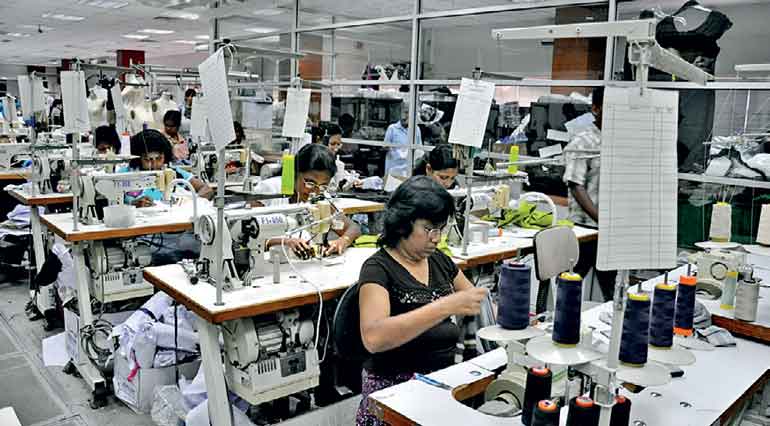Monday Feb 23, 2026
Monday Feb 23, 2026
Tuesday, 1 April 2025 04:24 - - {{hitsCtrl.values.hits}}

For decades, Sri Lanka’s small and medium enterprises (SMEs) have been the backbone of the country’s manufacturing sector, driving local industry, employment, and economic growth. However, policy shifts, particularly the abolition of the Simplified Value-Added Tax (SVAT), have placed significant strain on these businesses. With the repeal of SVAT due to happen in October this year, the long-term uncertainty surrounding these policy changes continues to pose a serious challenge for SMEs.
 The transition away from SVAT is not just a procedural shift—it is a structural change that disrupts the entire local manufacturing ecosystem. The additional 18% tax on local raw materials will make imports more competitive, dis-incentivising the use of locally sourced inputs. This shift breaks down long-standing supply chains, weakens domestic industries, and puts thousands of jobs at risk.
The transition away from SVAT is not just a procedural shift—it is a structural change that disrupts the entire local manufacturing ecosystem. The additional 18% tax on local raw materials will make imports more competitive, dis-incentivising the use of locally sourced inputs. This shift breaks down long-standing supply chains, weakens domestic industries, and puts thousands of jobs at risk.
Whilst theoretically these costs “could” be recovered at the time of export, a) there is a massive interest cost, and b) exporters have no faith in the ability of the Department to make these refunds. Given the backlog of vouchers to be cleared under the current cashless system, exporters cannot understand how the IRD would ever be able to pay cash refunds in a timely manner. Even if paid within the 45 days indicated, the SME will have this cash stuck for at least 75 days, as the IRD clock only starts after the month end.
Nearly impossible to sustain profitability
One SME manufacturer specialising in children’s apparel, which operates on a cost-sensitive model, shared their experience. The business sources thread, polybags, and cartons locally, but the new tax framework will make these purchases 18% more expensive overnight. With operating margins as low as 5-6%, the additional tax burden has made it nearly impossible to sustain profitability. The manufacturer now faces a difficult choice—either absorb the losses, reduce local procurement, or take on expensive bank loans to cover the cash flow gap. This is not just an isolated case; similar struggles are being reported across the industry.
A supplier of polybags and cartons, key components in garment packaging, is another example of how SVAT abolition disrupts the local supply chain. Previously, SMEs purchased these materials from domestic suppliers, ensuring a streamlined production process. However, with an 18% VAT burden on local purchases, import alternatives have become the more cost-effective option. This shift is already affecting local suppliers, who are seeing declining orders, resulting in layoffs and the risk of business closures.
The transition away from SVAT is not just a procedural shift—it is a structural change that disrupts the entire local manufacturing ecosystem. The additional 18% tax on local raw materials will make imports more competitive, dis-incentivising the use of locally sourced inputs. This shift breaks down long-standing supply chains, weakens domestic industries, and puts thousands of jobs at risk
The most devastating consequence of this tax policy is the fragmentation of Sri Lanka’s supply chain. Vertical integration—the competitive advantage that has kept Sri Lanka’s manufacturing sector viable—relies on local suppliers supporting manufacturers. When local thread and fabric suppliers face tax burdens that imported materials do not, manufacturers are forced to look abroad. This weakens the entire ecosystem, as interconnected businesses lose their ability to sustain each other.
A garment subcontractor working for a major exporter highlighted another pressing issue. Unlike large companies, SMEs often rely on buyers to supply the main fabric, but they must purchase additional materials like thread, needles, and packaging locally. With SVAT abolition, these businesses now have to pay VAT upfront and wait up to 75 days for refunds. Any delays in refund processing force them to take out bank loans to cover costs, which adds further financial strain. One subcontractor explained how, within just a few months, these cash flow issues could lead to bankruptcy, as they lack the financial reserves to withstand repeated delays.
Struggle to secure international orders
Beyond the domestic impact, the SVAT abolition places Sri Lankan manufacturers at a severe disadvantage in the global market. Competitors in Vietnam, Bangladesh, and Cambodia benefit from integrated supply chains and supportive tax policies, allowing them to keep production costs low. In contrast, Sri Lankan SMEs are facing artificially inflated costs that make it nearly impossible to compete on price. With export markets already demanding cost efficiency and speed, the added tax burden creates an untenable situation where Sri Lankan manufacturers struggle to secure international orders.
Another SME manufacturer, producing garments for international brands, shared their struggle. Their profit margins are typically just 4-6%, but with an 18% tax burden on materials, their financial model has become unviable. To bridge the gap, they have resorted to short-term loans, but accumulating debt at high-interest rates is not a sustainable strategy. If the government does not step in with a solution, they fear they will be forced to shut down their factory in Colombo and consolidate operations elsewhere, leading to significant job losses.
Temporary policy extensions, like the recent SVAT reprieve, offer momentary relief but do not address the root of the issue. Businesses need policy clarity, not indefinite delays that prevent long-term planning. Without a permanent resolution, manufacturers cannot make informed investment decisions, and the uncertainty discourages future growth.
The best way forward is to establish a tax framework that supports SMEs rather than penalises them. This means maintaining vertical integration by ensuring that local suppliers remain competitive. Policy reforms should be introduced gradually, with consultation from SME associations, the Inland Revenue Department, and economic experts. Moreover, a well-structured tax transition strategy would allow businesses to adapt without disrupting supply chains.
Sri Lanka’s SMEs have demonstrated remarkable resilience through economic crises, global disruptions, and shifting trade dynamics. However, they cannot sustain themselves under a policy environment that forces them into uncompetitive positions. If the country’s manufacturing sector is to survive and thrive, the Government must recognise that policies like SVAT abolition carry hidden costs that extend far beyond tax revenues. The future of Sri Lanka’s SME ecosystem depends on strategic policymaking that ensures stability, fosters growth, and maintains the integrity of local industry.
(The writer is the President, Sri Lanka Chamber of Garment Exporters.)